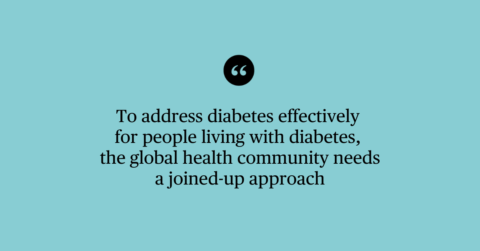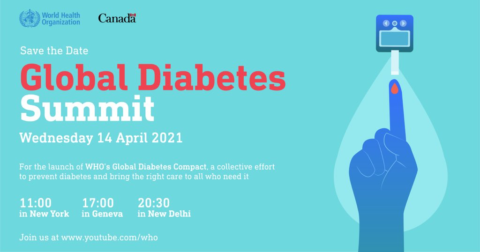17 November 2021 – Innovative biopharmaceutical companies, represented by the International Federation of Pharmaceutical Manufacturers and Associations (IFPMA), welcome the publication of the World Health Organization’s (WHO) latest report “Keeping the 100-year-old promise: making insulin access universal”. We fully agree that diabetes is a global health priority and that major gaps in access to quality diabetes care exist. Our industry has been working diligently to identify innovative solutions, in collaboration with WHO and other global health stakeholders, to improve the lives of people living with diabetes (PLWDs), especially in low- and middle-income countries (LMICs) where the unmet needs are arguably the most acute.
We are encouraged that the WHO report goes far beyond insulin and describes a wide range of barriers to access to quality diabetes care. These include supply chain shortcomings, such as excessive product mark-ups of up to 560%, which may represent up to 85% of the final price to the patient, as well as the worrying lack of access to affordable medical devices and consumables to support the appropriate delivery of insulin. We also welcome the call for enhanced focus on type 2 diabetes, targeted research and development, improved regulatory oversight and health system strengthening (including at the primary care level) in the areas of financing, governance, and service delivery capacity. There is a clear need to co-create holistic, person-focused solutions for diabetes as part of universal health coverage (UHC). In this regard, the WHO report cites a 2019 study (Hogerzeil, Recourt) which states that “the only sustainable future towards universal access [for insulin] in low- and middle-income countries is inclusion of standard diabetes care and prevention in national health insurance and social security programmes.” We agree. UHC, including diabetes and non-communicable disease (NCD) prevention and care, is strongly supported by our industry.
Having said that, while a stated aim of the WHO Global Diabetes Compact (which we have supported since its launch in April 2021) is to “unite key stakeholders from the public and private sectors, and, critically, people who live with diabetes, around a common agenda, to generate new momentum and co-create solutions”,[1] we regret neither the innovative biopharmaceutical nor the medical device and diagnostic industries were invited to provide input to the WHO report. If we had been able to provide input, we may have been able to address a number of points in the document that we believe do not correctly reflect the current insulin market, the role of the private sector, or key policy and regulatory challenges:
- The report states that there are “at least 40 companies” currently manufacturing or marketing insulin products globally, and yet focuses largely on the 3 largest insulin manufacturers as constituting the root cause of LMIC access and pricing issues. We welcome the report’s reference to an August 2021 IQVIA Institute analysis assessing data from 32 LMICs, but it omits a key IQVIA finding – that there is no correlation between the three largest companies’ market share, the number of other suppliers, and the average (ex-manufacturer) insulin cost per day (which is generally low).[2]
- The report documents that patents for all forms of human insulin and many insulin analogues have expired and that patents in low-income countries have been infrequent. However, in contradiction to this finding, intellectual property (IP) is represented in the report as a major barrier to access in LMICs, citing selective examples from the United States which has a vastly different IP landscape.
- While we support the use of biosimilars, we strongly believe that clinical safety studies (i.e., immunogenicity), clarification of interchangeability policies (e.g., mandatory supervision of the switch by the prescriber), and harmonization of regulatory requirements are necessary measures to ensure both patient access and safety.
- Company-supported patient access and support initiatives (including donations) are portrayed negatively – at a time when many diabetes stakeholders (including WHO) are calling for these programs to be continued or scaled up.
The WHO press release accompanying the report concludes that “industry has committed to a number of actions” including the development of a biosimilars policy blueprint, submission of data on insulin thermostability, and participation in new or expanded WHO prequalification programs, international pooled procurement and aggregated demand mechanisms, and global reporting mechanisms. To avoid any future misunderstandings related to industry commitments, IFPMA and its members have consistently stated that they are ready and willing to work with the WHO and other global health stakeholders on five activities that we believe will have the greatest impact on PLWDs:[3]
- Renew multi-stakeholder partnerships to deliver integrated diabetes care;
- Support diabetes co-packaging solutions to provide the diabetes products and services that patients in LMICs need at the point of care;
- Assess new types of aggregated demand and supply/procurement mechanisms that could be developed for diabetes, to address market dysfunctionality and build sustainable solutions;
- Develop new collaborations to bring digital health innovations to support PLWDs, caregivers and healthcare professionals; and
- Support regulatory advances, including product prequalification and insulin thermostability.
In April 2021, the biopharmaceutical industry made a commitment to collaborate with WHO and other global health stakeholders to co-create tangible solutions to improve the lives of PLWDs, according to the stated aims of the WHO Global Diabetes Compact. We stand by the statement we made at that time: “People living with diabetes, or those at risk of developing diabetes need to be able to get help, in the shape of a package of products, services and support. They need to be able to access affordable, quality diabetes prevention, diagnosis treatment and control. That is why our partnerships in supporting health systems are important in reaching more people living with diabetes. Our industry is committed to scaling up existing initiatives and exploring new collaborative models, in partnership with WHO, governments, civil society, health system stakeholders and other industrial sectors.”[4]
[1] https://www.who.int/news/item/14-04-2021-new-who-global-compact-to-speed-up-action-to-tackle-diabetes
[2]https://www.iqvia.com/insights/the-iqvia-institute/reports/understanding-insulin-market-dynamics-in-low-and-middle-income-countries
[3] See, for example: https://backslashcoding.com/work/old_ifpma/global-health-matters/dialogue-on-global-diabetes-care-with-james-anderson-what-is-needed-as-we-mark-another-world-diabetes-day/
[4] https://backslashcoding.com/work/old_ifpma/global-health-matters/the-global-diabetes-compact-launch/











